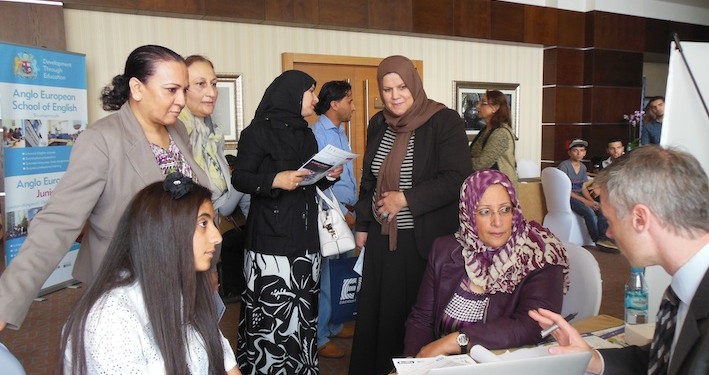As Libya begins to rebuild its infrastructure two years after its civil war, a “golden opportunity” has arisen for foreign English language, VET and HE institutions to recruit students funded by the government or private companies.
News and business analysis for Professionals in International Education
Have some pie!
Libya offers educators “golden opportunity”
 Libyans at an exhibition organised by English UK
Libyans at an exhibition organised by English UK The British Council alone expects 17,000 Libyans to study at UK institutions this year through a scholarship programme recently announced by the Ministry of Education.
“Libya has huge potential right now,” Tevfik Sekerci, Commercial Director for UK-based consultancy Prime Education, told The PIE News. “It’s a small country but almost half of the population of five million needs to be trained.”
Opportunities are there for any market willing to commit the time
Sekerci has been visiting the country monthly over the past two years and recently helped the UK’s language teaching association, English UK, with a UK Trade and Industry-funded trade mission to the country that saw 12 providers meet with over 700 students and professionals.
“There is clearly huge demand in Libya for all kinds of training, and English language teaching in particular,” said Annie Wright, deputy chief executive of English UK.
“It was one of the most beneficial things we’ve ever done.”
The boon for foreign educators will be bolstered by government funding as well as private sector support. The National Oil Corporation, representing 20 different companies, told English UK delegates that there was a training budget of US$50-60 million creating a “golden opportunity” for providers. Meanwhile Khaled Gsis of the Petroleum Training and Qualifying Institute told delegates: “We need an army of English language teachers.”
Despite petroleum contributing £83 billion a year to the country’s GDP, upskilling is also necessary for the country’s emerging industries including mining and tourism. A recent TVET UK MOU is likely to extend opportunities for UK vocational providers in this regard. “If managed properly Libya could be much [more successful] than the UAE,” said Sekerci.
Difficulties for students to study in the UK with their families due to visa regulations has boosted interest in Canada and Malaysia, says Sekerci. But, he adds, opportunities are there for any market willing to commit the time.
“If you’re an English language provider and you go to Libya and you say ‘this is what I’m doing, can you send me some students’, it’s not going to happen,” he said. “Providers should work with a local partner on the ground.”
Starting April 2014, Sekerci will organise a three-day education fair of English language centres or universities looking to recruit students or start building their brand in the market. However he acknowledges providers will need time to capture the market. “In Libya nothing is tomorrow,” he said.
Still looking? Find by category:


